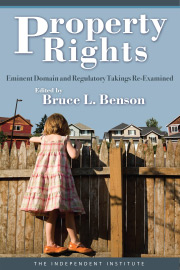A year ago, the Supreme Court’s Kelo v. New London ruling said government can forcibly transfer homes and businesses to private developers to serve the public purpose. The International Economic Development Council, an organization of urban central planners, had high praise for the Kelo Court, saying “eminent domain is critical to the economic growth and development of cities and towns throughout the country.”
If Kelo gave a green light on eminent domain, lots of local planners have stepped on the gas. The city of Long Beach condemned the Filipino Baptist Fellowship church to let developers build condos. In Daytona Beach, the city is taking three beach front properties to make way for a retail complex, and the city attorney said broader powers under Kelo factored into the decision. In Memphis, planners put their cross hairs on some choice riverfront property to hand over to private developers. The head planner there said Kelo “definitely gives the city more tools in its tool box for dealing with the legal issues surrounding that piece of property.”
On the other hand, Kelo also struck a nerve with property owners and advocates, creating a powerful backlash effect. Opinion polls after the ruling showed as much as 98% disagreement with Kelo. Grassroots movements sprang up, and citizens went knocking on their legislators’ doors.
In California, eminent domain restrictions are on seven legislative bills, four constitutional amendment proposals, and at least one referendum likely for the November ballot. The "Protect our Homes" initiative would prohibit California agencies from transferring property between private parties for the purpose of economic development or tax revenue. It would also add costs using eminent domain, requiring governments to retain ownership over seized property or to designate it for a legitimate public use. Indicating the strong property-rights environment in Sacramento, the initiative would even require governments to compensate property owners for environmental and other regulations that diminish property value. As of May 15, the initiative had nearly one million signatures, qualifying it for the November ballot.
Connecticut state senator John McKinney remarked, “very few issues are this easy to understand. My constituents have shown feelings of outrage, surprise, and some are scared. Few homes will be taken by eminent domain, but anyone’s home can be taken by eminent domain.”
In principle, eminent domain can help in a few cases, such as when a homeowner holds out for a price so high it would put a worthwhile project in red ink. But developers are crafty people with lots at stake and a long history of figuring ways around hold out problems.
A decade ago, three dying blocks in the heart of Seattle were acquired and redeveloped as fancy retail without eminent domain. To get big anchor stores to commit, the initial investors used an impressive array of contingent contracts, land swaps, and street maintenance promises from the city. That got mid-size retailers and national chains interested in some of the key corner locations, which paved the way for boutique shops and hangouts to fill in the rest. The project sparked about 100 other private initiatives to the tune of 12 million square feet of planned construction between 1998 and 2000.
Seattle isn’t alone. CityPlace in West Palm Beach. Rivercenter in San Antonio. Santana Row in San Jose. Mockingbird Station in Dallas. These are the projects of which urban planners dream. Mixed-use residential and business communities supporting eclectic retail and nightlife, with rippling effects onto surrounding neighborhoods. Even the land for Disney World, a tract bigger than San Francisco, was acquired privately. Eminent domain wasn’t critical to these projects.
Too often planners get eager to manufacture success stories in their own home towns, neglecting underlying economic realities. In these cases, eminent domain simply pries open opportunities that wouldn’t otherwise make economic sense. This has ripple effects, too. Bad ones. It attracts developers who see eminent domain as a cheaper way to get the land they need, especially with hold outs. Developers spend valuable resources persuading policymakers rather than building better, lower cost housing. Regulators further their careers by taking credit for revitalization. Eminent domain doesn’t serve the public interest as much as it serves a cozy triangle of special interests.
Who can argue against more jobs and a sound tax base? And for just wanting to do some good, you can hardly blame the central planners. But even under Kelo they can be constrained by state laws that capitalize on the backlash environment. So far 18 states have passed laws restricting eminent domain, and in six others new legislation awaits governor signature. Some of these laws may turn out to be more symbolic than real, making it all the more important to ban development takings altogether. We need state laws that take the eminent domain out of economic development.









